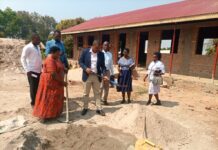The 10 designated schools in Gulu, include Pawel Angany Primary School, Omot Hill Primary School, Aswa Camp Primary School, Abaka Primary School, Patiko Prison Primary School, Kiteny-Owalo Primary School, Oywak Primary School and Rwot Obilo Primary School. However, in Amuru the beneficiary schools are still undergoing identification and vetting.
Up to 400 children with disabilities in 20 selected government-aided primary schools are set to benefit from a three-year inclusive education intervention in Acholi sub-region. The targeted learners include those with hearing impairments, as well as those with physical and mental disabilities.
Dubbed Together for Inclusion (ToFI), the project implemented by Save the Children – Uganda seeks to improve infrastructures like school buildings, classrooms, play areas, transport and toilet facilities, among others, to cater for the needs of children with disabilities. It also includes teaching the curriculum through the shared responsibility of regular teachers, parents, the community, resource teachers and non-disabled children.
The 10 designated schools in Gulu, include Pawel Angany Primary School, Omot Hill Primary School, Aswa Camp Primary School, Abaka Primary School, Patiko Prison Primary School, Kiteny-Owalo Primary School, Oywak Primary School and Rwot Obilo Primary School. However, in Amuru the beneficiary schools are still undergoing identification and vetting.
Ivan Odong and Vicky Acan, aged 12 and 13 years respectively, told URN that due to their physical disabilities, they have experienced exclusion and injustices in co-curricular activities owed to the less friendly amenities at Kiteny-Owalo Primary School.
Although some facilities for disability learners like rams at the entrance of some of the classroom blocks have been improved, the school headteacher Filder Mary Lakareber, notes that playground and washrooms, especially for girls with disabilities, are still missing.
Immaculate Nalubyayi, an Advocacy and Communications Officer with Save the Children – Uganda regional office in Gulu said that their intervention aims at making such conventional schools in both Gulu and Amuru Districts safer for children living with disabilities.
The Northern Uganda Parliamentary Representative for Persons with Disabilities (PWDs), William Nokrach observes that the implementation of policies like the Building Control Act which would uphold the rights of children living with disabilities, among others, has been difficult and warrants radical advocacy.
Nokrach explains that the availability of abundant opportunities across different fields such as music, sports, martial arts, art and craft can make children with disabilities excel in multiple myriad arenas, which Uganda’s current education system doesn’t favourably focus on.
Inclusive schooling is an education system that embraces all learners in a school environment, irrespective of gender and abilities to help them freely integrate and study together with their non-disabled peers conveniently.
The UN Convention on the Rights of Persons with Disabilities (CRPD) recognizes the right to inclusive education for all persons with disabilities. The approach benefits children with disabilities to prepare for full participation in community life.
A 2018 United Nations report indicates that between 93 and 150 million children are living with a disability globally. Of those, 33 million, especially in developing countries like Uganda, are out of school, yet those in school are less likely to complete primary, secondary and further education.


